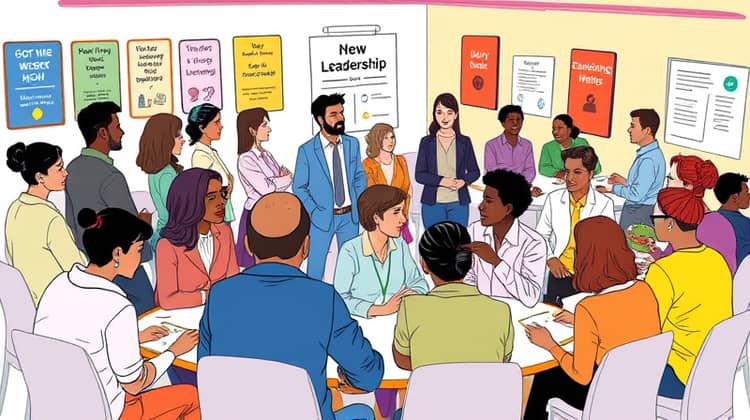In today's fast-paced and ever-changing world, effective leadership is more crucial than ever. The ability to influence and inspire teams has a direct correlation with the success of an organization. This article will delve into the importance of developing leadership skills and provide practical steps for personal growth.
The pathway to becoming a better leader involves continuous learning, self-assessment, and the willingness to adapt. By understanding the core principles of leadership, individuals can foster an environment that promotes innovation, strengthens relationships, and drives accomplishments. This journey of leadership development is not only about enhancing professional capabilities but also about personal enrichment and fulfillment.
By the end of this article, readers will gain insights into the various facets of leadership skills, discover essential traits that define great leaders, and learn actionable steps to cultivate these skills effectively. Let's embark on this transformative journey of developing leadership skills.
Understanding Leadership

To lead effectively, one must first understand what leadership truly embodies. At its core, leadership involves guiding a group towards achieving a common goal while maintaining a positive and productive environment. It transcends mere authority or management; it is about influence, inspiration, and motivation.
A good leader is one who can adapt to changing circumstances, engage their team, and foster collaboration. Understanding your style of leadership is crucial as it lays the foundation for how you interact with others and how your influence manifests within the organization.
Moreover, effective leadership is built on trust and credibility. When team members believe in their leader's capabilities and vision, they become more motivated to achieve the collective goals set forth. Thus, a deep comprehension of leadership dynamics is essential for anyone looking to cultivate these skills.
- Leadership is not just a title, but a responsibility.
- It involves developing relationships based on trust and respect.
- Successful leadership requires continuous self-improvement and learning.
Essential Leadership Skills

To be an effective leader, one must possess a set of essential skills that facilitate the ability to inspire and guide others. These skills can either be innate or cultivated through practice and dedication. Understanding these skills is the first step towards effective leadership.
Among the most critical leadership skills are communication, empathy, decision-making, and adaptability. Each of these skills plays a significant role in shaping how leaders interact with their teams and stakeholders, ultimately influencing overall performance and morale.
Leaders who continuously hone these skills are more likely to navigate challenges successfully and foster an environment where team members feel valued and empowered. By developing these capabilities, leaders can inspire their teams to achieve exceptional outcomes.
- Effective communication
- Empathy and emotional intelligence
- Decision-making and problem-solving
- Adaptability and flexibility
- Conflict resolution
Why Leadership Skills Are Important

Leadership skills are vital for several reasons, starting with their direct impact on team dynamics and organizational culture. Strong leadership promotes an atmosphere of collaboration, respect, and accountability, which can lead to increased employee satisfaction and retention.
Furthermore, in times of crisis or change, effective leadership can make a significant difference in how teams navigate through challenges. Leaders with well-developed skills can provide clarity, support, and direction, ensuring that their teams remain focused and motivated.
- Strong leadership can lead to increased productivity.
- Effective leaders inspire and motivate their teams.
- Leadership skills help in managing change and navigating challenges.
How to Develop Leadership Skills

Developing leadership skills is an ongoing process that requires commitment and a proactive approach. It involves various strategies and practices that promote growth and enhancement of one’s leadership capabilities.
Importantly, aspiring leaders must be open to feedback, willing to take on challenges, learn from peers, and reflect on their experiences. These elements are essential for anyone looking to elevate their leadership potential.
1. Seek Feedback
One of the most effective ways to develop leadership skills is by actively seeking feedback from peers, mentors, and even subordinates. Feedback provides essential insights into one's strengths and areas for improvement.
By creating an environment where candid feedback is encouraged, leaders not only demonstrate their commitment to self-improvement but also foster a culture of open communication within their teams.
2. Embrace Challenges
Embracing challenges is crucial for personal growth and development in leadership. Taking on challenging projects or roles can expose leaders to new experiences and opportunities to enhance their skills.
Not only does facing challenges build resilience, but it also sharpens problem-solving abilities and decision-making skills. This phase of growth helps leaders gain confidence in their capabilities.
The challenges can include taking on new projects, leading a team through a difficult situation, or stepping into roles that stretch their current abilities.
- Push yourself beyond your comfort zone.
- Learn to manage stress effectively during challenging situations.
- Seek opportunities that allow for growth despite potential risks.
Embracing challenges ultimately contributes to a more robust and adaptable leadership style, critical for effective leadership in any environment.
3. Learn from Others
Learning from other leaders can significantly influence one's development. This involves observing how successful leaders operate, their decision-making processes, and the ways they communicate with their teams.
Additionally, engaging in networking opportunities and mentorship programs can provide invaluable insights and advice that can inform one's leadership journey.
- Attend workshops and leadership seminars.
- Read books and articles by respected leaders.
- Participate in networking events to share experiences.
4. Reflect on Your Experience
Reflection is an essential part of leadership development. Taking the time to evaluate your experiences helps identify effective strategies and areas that need improvement. Regular reflection can lead to greater self-awareness.
By asking yourself questions about your decisions and their outcomes, you can gain insights that inform future actions and enhance your leadership abilities.
- Keep a leadership journal for personal reflections.
- Analyze both successful and challenging experiences for lessons learned.
Reflection equips leaders with the knowledge to navigate similar situations more effectively in the future.
5. Set Goals
Setting specific, measurable goals is an effective strategy for leadership development. Goals provide direction and motivation, ensuring that your efforts remain focused and purposeful.
By defining clear objectives for your growth as a leader, you can track your progress and make necessary adjustments to foster continual improvement.
- Identify short-term and long-term leadership goals.
- Establish actionable steps to achieve these goals.
- Regularly evaluate your progress and adjust as needed.
Goal-setting can empower leaders to remain committed to their personal and professional growth over time.
6. Take Initiative
Taking initiative is a vital aspect of leadership that often distinguishes great leaders from the rest. By proactively seeking opportunities to lead, you can enhance your skills and demonstrate your commitment.
Whether it's volunteering for new projects or proposing innovative ideas, taking initiative allows you to take control of your leadership journey.
- Explore new projects or roles that require leadership.
- Encourage team members to take initiative as well, fostering a culture of leadership within your group.
- Seek opportunities for continuous learning and development.
Conclusion

In conclusion, developing leadership skills is a vital endeavor that can significantly impact both personal satisfaction and organizational success. As individuals strive to enhance their leadership competencies, they not only improve their careers but also contribute to the overall success of their teams.
By understanding the principles of effective leadership and actively nurturing essential skills, anyone can become a powerful and influential leader, inspiring others and driving positive change.














